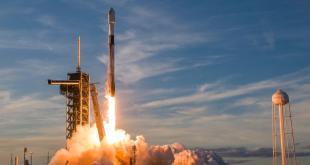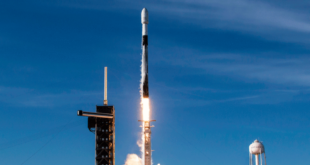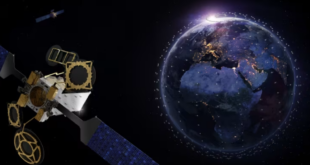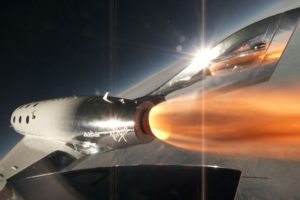
After several years hiatus since the crash of VSS Enterprise in 2016, Virgin Galactic successfully carried out a flight test of its VSS Unity SpaceShipTwo spaceplane from the Mojave Air and Space Port in California on 5 April 2018.
“We are delighted to report on a major step forward for Virgin Galactic today, as SpaceShipTwo VSS Unity safely and successfully completed her first supersonic, rocket-powered flight. After two years of extensive ground and atmospheric testing, the passing of this milestone marks the start of the final portion of Unity’s flight test program,” said a Virgin Galactic statement released on 5 April 2018.
VSS Unity is also the first Virgin Galactic vehicle to have been wholly built by Virgin Group subsidiary, and Virgin Galactic sister company, The Spaceship Company. According to the Virgin Galactic statement, engineers and technicians of The Spaceship Company, “were justifiably proud today to be a part of this compelling demonstration of their capabilities in action.”
In what appears to have been a flawless flight test, Virgin Galactic engineers will now review the flight data before proceeding with what George Whitesides, the CEO of Virgin Galactic, has said will be a year of aggressive flight testing of the SpaceShipTwo.
“The flight has generated valuable data on flight, motor and vehicle performance which our engineers will be reviewing. It also marks a key moment for the test flight program, entering now the exciting phase of powered flight and the expansion to full duration rocket burns. While we celebrate that achievement, the team remains focused on the challenging tasks which still lie ahead,” read the Virgin Galactic statement.
The flight test of VSS Unity occurred days after a visit to Virgin Galactic’s facilities at the Mojave Air and Space Port by HRH Prince Mohammed bin Salman al Saud, the Crown Prince of the Kingdom of Saudi Arabia, and who is also the chairman of the Saudi Public Investment Fund (PIF), one of Virgin Galactic’s biggest investors.
Virgin Orbit Announcements
Meanwhile, Dan Hart, the CEO of Virgin Orbit – a sister company of Virgin Galactic – told the Space 2.0 conference in San Juan, California, on 4 April 2018 that the company intends to be a responsive launch provider as well as offer services such as large satellite constellation maintenance and space debris removal.
The entire product package was described by Hart as being a “concierge service to orbit,” according to Space News.
On constellation maintenance, Hart said that Virgin Orbit is “under contract to do operations and maintenance,” Hart said. “The satellite constellations that have hundreds or thousands of satellites will send them up on large rockets. Then, as the satellites age or there’s infant mortality, there will be a need to replenish satellites at various planes.”
Hart told the Space 2.0 audience that Virgin Orbit is uniquely placed for constellation maintenance and replenishment because of its air launch capability via a modified Boeing 747 airplane, called Cosmic Girl, and launcher.
“If you need to put two satellites in a plane, you are going to waste a lot of money buying a large rocket or spend a lot of time drifting over a hitchhiked satellite to your orbit,” Hart said. “So there’s a lot of interest from those companies in dedicated launch capability.”
A number of companies, such as OneWeb, are planning to put thousands of small communication satellites into low-Earth orbit (LEO) over the next decade.
Virgin Orbit also hopes to assist large constellation operators by “putting up spares, servicing specific planes and potentially handling debris if it shows up in their orbit,” Hart said.
Hart also announced that Virgin Orbit intends to get involved in the space debris removal business. “There will be a real need to clear out debris in low Earth orbits if satellites have issues in their orbital slots. And with thousands of satellites planned, that is going to happen,” Hart told the Space 2.0 audience. “I’ve recently become a believer that space debris is a problem that needs to be solved and I’m happy to see there are companies rising up to take that on.”
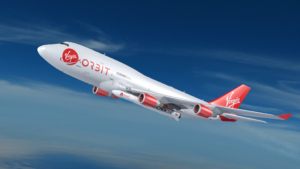
On responsive launch Hart said that more and more satellite operators are starting to understand the commercial appeal of a concept that has long been an aspiration of the national security space community.
“Commercial customers say the idea of getting into orbit within days is very appealing for them,” Hart said. “For national security world, that has always been a goal. For once, the commercial and government worlds are perfectly well aligned.”
In order to achieve a responsive launch capability, Hart also announced that as well as flying the Cosmic Girl 747 from the Mojave Air and Space Port in California, Virgin Orbit is also “planning to fly out of the Kennedy Space Center,” in Florida, Hart said.
“As the industry matures and people want to go to different orbits, we can fly out of pretty much any airport that can handle a 747. Of course we have to handle some propellant as well and licensing and so forth,” Hart added.
The Saudi PIF and Virgin Group signed a non-binding Memorandum of Understanding (MoU) in October 2017 for a partnership under which PIF invests approximately U.S.$1 billion into Virgin Galactic, The Spaceship Company, and Virgin Orbit, with an option for U.S.$480 million of future additional investment in space services.
The investment has resulted in PIF taking a significant stake in Virgin Galactic, The Spaceship Company, and Virgin Orbit, alongside Virgin Group and Abu Dhabi’s Aabar Investments. The investment supports Virgin’s human spaceflight plans and accelerate Virgin Orbit’s manufacturing and operational capabilities. It has also aided the development of next generation low cost small satellite launch systems and commercial supersonic point-to-point travel capabilities; and includes the potential to develop a space-centric entertainment industry in Saudi Arabia.
 SpaceWatch.Global An independent perspective on space
SpaceWatch.Global An independent perspective on space

